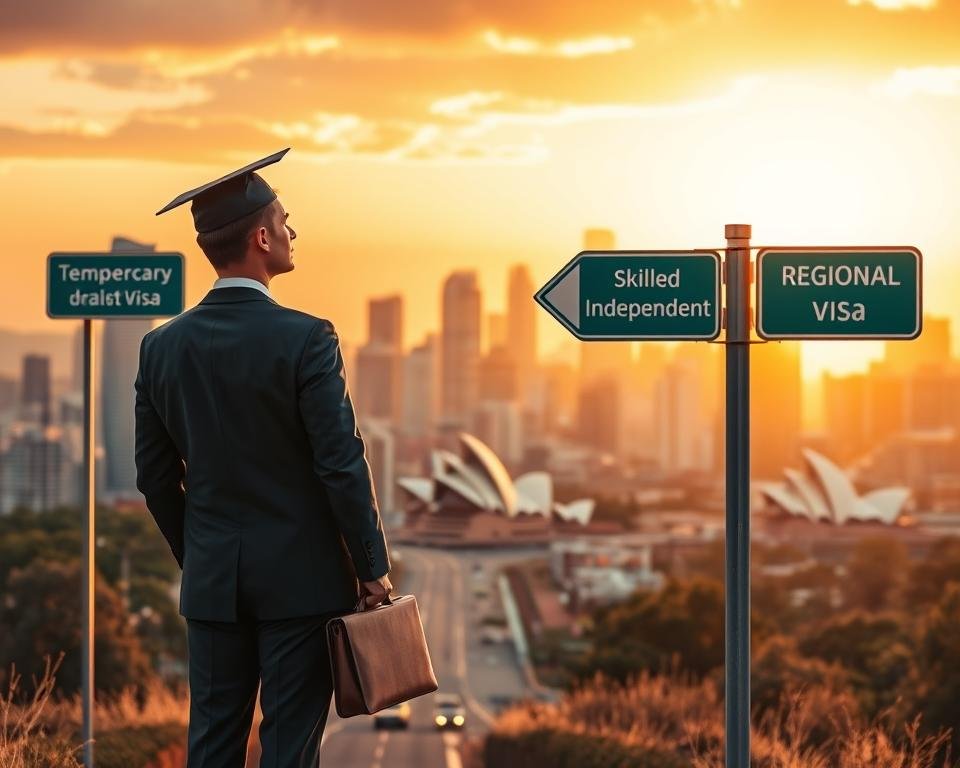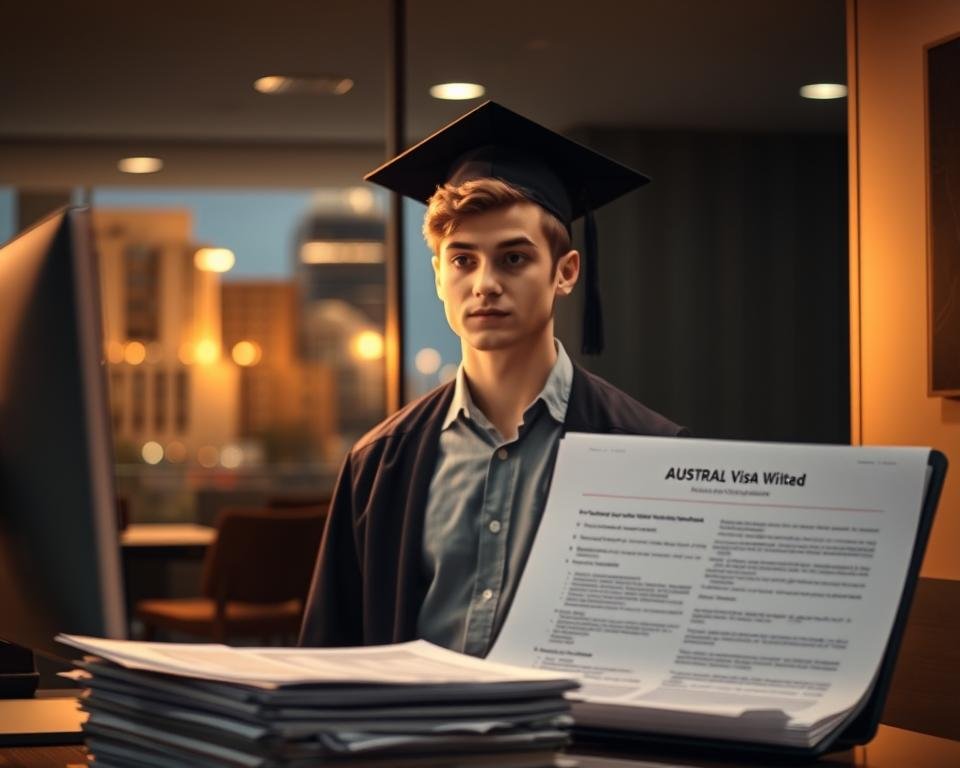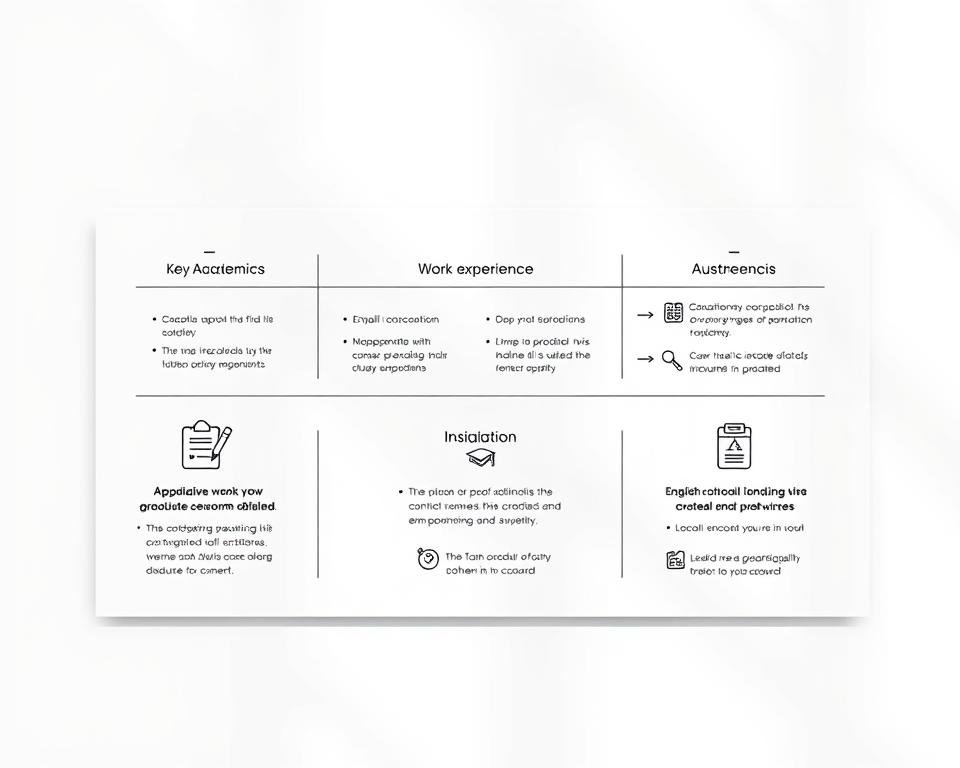Post-Study Work Visa Options for MBA Graduates in Australia

Imagine you've just finished an MBA at a top Australian university, like the University of Melbourne or the Australian National University. You're eager to start your career in this vibrant job market. But, you might wonder about the post-study work visa options for MBA graduates in Australia.
Understanding the MBA graduate visa Australia can seem daunting. But don't worry, this guide will help you. It will give you key insights into your options and how to use your degree to its fullest.
- Understanding Post-Study Work Visas in Australia
- Eligibility Criteria for the MBA Graduate Visa Australia
- Work Rights After Completing an MBA in Australia
- Exploring Skilled Visa Options for MBA Graduates
- Post-Study Work Visa Requirements
- MBA Graduate Visa Processing Time
- Visa Sponsorship Opportunities for MBA Graduates
- Visa Extensions for MBA Graduates
- Australian Work Rights for MBA Graduates
- MBA Immigration Australia: Trends and Insights
- Post-Graduation Job Search Strategies in Australia
Understanding Post-Study Work Visas in Australia
The post-study work visa Australia (subclass 485) is a big chance for international graduates. It's great for those with advanced degrees like an MBA. This visa helps graduates easily move into the Australian job market after studying.
There are two main parts to this visa: the Graduate Work stream and the Post-Study Work stream. The Graduate Work stream is for students with skills needed in Australia. It lets them get work experience in their field.
The Post-Study Work stream is for those who have finished a higher education degree in Australia. It lets them work in Australia for a time that depends on their degree.
It's important for graduates to know the visa rules well. This visa lets recent students improve their skills and help the Australian economy. It makes Australia a great place for international students to study.

Eligibility Criteria for the MBA Graduate Visa Australia
To apply for the MBA graduate visa in Australia, you must meet certain criteria. These criteria check if you have the right qualifications and skills. They help ensure you can make a positive impact in the Australian workforce.
The key points include academic qualifications, English language skills, and when to apply. Let's look at each of these in more detail.
Academic Qualification Requirements
Candidates need to have finished a recognised MBA or similar degree from a reputable Australian school. This makes sure you have a solid educational base. It prepares you for the professional world's challenges.
English Language Proficiency
Being able to speak English well is very important. You can show this with IELTS, TOEFL, or PTE test scores. The Department of Home Affairs sets a minimum score for each test. This ensures you can communicate well in English.
Schedule for Application Submission
Knowing when to apply is key. You must apply within a set time after finishing your MBA. Being aware of these deadlines helps you stay organised. This way, you can meet the application requirements on time.

Work Rights After Completing an MBA in Australia
Graduates with an MBA from Australia have valuable skills. They can work full-time, part-time, or casually in many fields. The post-study work visa helps them start their careers and gain experience.
The length of work rights depends on the school and when you finished your MBA. You can choose your job freely. This makes it easier to move from studying to working.
It's important to know any work restrictions. You can work in jobs that match your skills, but there might be rules. Knowing these rules helps you stay legal in Australia.

It's wise to learn about your work rights after an MBA in Australia. Look at resources like the post-study work visa application guide. It can help you understand your job options better.
| Aspect | Details |
|---|---|
| Visa Type | MBA Graduate Visa |
| Work Rights Duration | Up to 2-4 years depending on the institution |
| Employment Types | Full-time, Part-time, Casual |
| Compliance Requirements | Adhere to visa conditions and regulations |
| Potential Sectors | Finance, Marketing, Management, Consulting |
Knowing your work rights after an MBA in Australia is key. It helps you make the most of your time here. Explore your job options and grow both personally and professionally.
Exploring Skilled Visa Options for MBA Graduates
Australia has many skilled visa options for MBA graduates wanting to start their careers. Knowing these options can help find jobs and make a smooth transition to a rewarding career. The Australian job market is always looking for skilled people, which is great for MBA graduates.
Key Skilled Occupations for MBA Graduates
There are several key jobs for MBA graduates. These jobs match the skills learned in studies and what the job market needs. Some common roles include:
- Management Consultant
- Marketing Manager
- Business Analyst
- Financial Manager
- Human Resources Manager
These jobs need strategic thinking, leadership, and industry knowledge. Matching your skills with job opportunities can lead to good visa options. Knowing the job market helps make better career choices and increases visa chances.
Permanent Residency Pathways for MBA Graduates
Many MBA graduates want to find permanent residency. The Skilled Independent Visa (subclass 189) and the Skilled Nominated Visa (subclass 190) are good options. Both visas are for skilled people who help the Australian economy.
To get these visas, you need to meet certain criteria. This includes a points system based on age, qualifications, and work experience. Getting permanent residency lets graduates live in Australia for a long time. For more information, check out post-study work visa applications.
Post-Study Work Visa Requirements
For international students in Australia, knowing the post-study work visa requirements is key. This visa lets students gain practical experience after finishing their studies. To apply, you need specific documents to show you're eligible.
These documents include your academic transcripts and certificates. They prove you've completed an eligible course. English language skills are also important. You might need to show results from tests like IELTS or TOEFL to meet the Australian Government's language standards.
Health insurance is a must for visa applicants. You need to have Overseas Student Health Cover (OSHC) or similar health insurance in Australia. You also need to show you have enough money to support yourself when you first arrive.
Character assessments are another important part of the application. You'll need to provide police clearance from your home country. This shows you meet the character standards set by Australian immigration authorities. Following these steps can greatly improve your chances of getting a post-study work visa.
MBA Graduate Visa Processing Time
Knowing how long it takes to process an MBA graduate visa is key for those ready to start their career in Australia. The process has several stages, each adding to the total time it takes to get approved. Understanding what affects the speed can help you prepare better.
Typical Processing Times for Applications
The time it takes to process an MBA graduate visa varies. It depends on the application type and how many are being processed. On average, it can take from a few weeks to several months. Submitting all needed documents on time helps speed up the process.
Factors Influencing Processing Speed
Several things affect how fast an MBA graduate visa is processed. Those with all their documents ready usually face less delay. But, delays can happen due to:
- More applications during busy times.
- Need for more info or clarification from applicants.
- Errors or missing info in the documents.
Knowing these factors can help you move through the process faster and possibly shorten your wait time.
Visa Sponsorship Opportunities for MBA Graduates
Visa sponsorship for MBA graduates is a big chance for those wanting to work in Australia. Those with the right skills can get sponsorship by targeting the right employers. Knowing how it works is key to finding good opportunities.
How to Secure Sponsorship
To get sponsorship, MBA graduates should try a few things:
- Networking: Making connections in your field can lead to sponsorship chances.
- Tailored Applications: Make your CV and cover letter match the job you want.
- Researching Companies: Look for employers that sponsor international workers.
- Preparing for Interviews: Show you know what employers need for sponsorship.
Employer Requirements for Sponsorship
Employers have certain needs for sponsorship. These usually include:
- Skills and Qualifications: You need the right skills and qualifications for the job.
- Work Experience: Having relevant work experience helps your application.
- Professional References: Good references from past employers are important.
- Compliance with Australian Laws: Employers must follow visa sponsorship laws.
For example, companies in certain sectors can sponsor visas for recent graduates. The MATES Visa lets graduates from Indian universities live, work, and study in Australia for up to two years. More on the MATES Visa is here.
Visa Extensions for MBA Graduates
Visa extensions for MBA graduates are key to keeping jobs in Australia. To stay longer, graduates must meet certain criteria. This includes job offers, ongoing education, or skills improvement.
Applying for visa extensions involves several steps. First, check if you're eligible under current rules. You'll need to show your skills match Australia's job market and have the right job documents. Knowing the different types of extensions is also important.
Many graduates get help from visa experts. This makes the process easier and ensures all documents are correct. Knowing what skills are in demand can also help your application.
In short, knowing about visa extensions helps MBA graduates plan their future in Australia. With the right preparation and knowledge, getting a visa extension is more likely.
Australian Work Rights for MBA Graduates
For MBA graduates in Australia, knowing about work rights is key. They have rights to look for jobs with a valid visa. The visa type affects how much work they can do.
MBA graduates with a post-study work visa can work for two to four years. This lets them get real-world experience, which is vital for their career. They must follow their visa's rules to avoid problems.
There are also limits on the kind of work they can do. Some visas only allow work in certain fields. Knowing these rules helps graduates choose the right jobs. Employers might ask for proof of visa status, so graduates should be ready to show it.
In short, understanding work rights helps MBA graduates in Australia. It helps them find the right job and follow visa rules. This way, they can make the most of their career opportunities.
MBA Immigration Australia: Trends and Insights
The world of MBA immigration in Australia is always changing. Trends in visa applications are shifting, and global competition is getting fiercer. Prospective students need to keep up with these changes to make the most of their opportunities in Australia.
Recent data shows how applicant rates and successful migrations are changing. It also highlights the policies that shape the immigration landscape. Knowing these trends is key to getting a visa in a competitive field.
Current Trends in Visa Applications
Recent stats show more visa applications from MBA graduates. Several factors are driving this increase:
- Increased Demand: More international students are seeking MBA degrees, leading to more visa applications.
- Diverse Backgrounds: Graduates come from many educational and professional backgrounds, adding to Australia's talent pool.
- Policy Changes: New immigration policies can affect how easily graduates can move from student to professional status.
- Regional Opportunities: Some areas in Australia offer special incentives for MBA graduates, making them more attractive.
As visa application trends evolve, it's critical for students to stay updated on policies and market demands. This knowledge helps them make better decisions about their post-MBA careers in Australia.
Post-Graduation Job Search Strategies in Australia
For MBA graduates entering the Australian job market, it's key to have good job search strategies. Networking is a powerful tool. It helps by connecting you with alumni and industry experts at events or casual meetups. LinkedIn is also great for showing off your skills, finding employers, and joining groups for industry talks.
It's also important to tailor your resume for each job you apply for. Australian employers like to see relevant skills and experiences. Highlighting your achievements and the impact of your projects can make you stand out.
Using job search engines and company websites can uncover hidden job opportunities. Many jobs are found through referrals, not just ads. Being active on professional networks and open to temporary roles can lead to full-time jobs. This makes job searching in Australia both effective and varied.
If you want to know other articles similar to Post-Study Work Visa Options for MBA Graduates in Australia You can visit the category Migration.

Leave a Reply